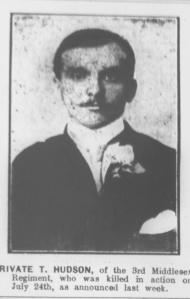In a prelude to conscription, which was to follow in 1916, it was announced that the Government was to embark on compiling a National Register of all men and women aged between 16 and 65.
Its aim was to provide reliable statistics of all men who were physically fit for the army and of women able to be employed in munitions manufacture.
In light of the number of men returning from the front with severe injuries and without limbs a piece on page 2 of the Ashbourne Telegraph in the notes and Comments column is surprisingly insensitive:
“The Cost of an Artificial Man
With exhibitions and catalogues of artificial limbs now brought to notice, one gets to calculating the cost of a reconstructed man. Seemingly a little over £100 would suffice.
A pair of artificial legs cost about £30; and a pair of arms about £20. Ears with drums &c., cost £15 each; eyes £6 a pair and so on. Without heart and brains a man is worth about £100. With them the price might change.”
Another Ashbourne soldier had been added to the paper’s roll of honour. Private T Hudson, serving with the 3rd Middlesex Regiment was reported to have been killed on July 24. A letter from his Platoon Sergeant to his wife in Tideswell said that before he died Hudson had said he wished he could see her and their young son.
The eldest son of Mr and Mrs Hudson of Union Street, he was one of three brothers serving in the Army. Sergeant W Hudson had been twice wounded.
The top item in the public notices on page 4 was the announcement of a Mass Patriotic Meeting to mark the anniversary of the declaration of war.
‘All patriotic people’ were invited to attend the Market Place on Friday, August 6, at 8pm.
The notice stated: “A resolution will be moved declaring the inflexible determination of the nation to continue to a victorious end the present struggle for Liberty and Justice.”
The band of the 1st and 2nd battalion of The Sherwood Foresters would play in the Market Place from 6pm to 7pm.
Bombardier Burns of the Royal Field Artillery had written to the Ashbourne Telegraph, asking if friends in the town could send out some cards or ‘an old football’ to help them pass the time in France.
Restrictions on the sale of alcohol had been introduced when Derbyshire was designated a military area, forcing pubs in Ashbourne and other towns to close earlier. Notice was given in the Telegraph this week of further restrictions on the sale of drink to men in uniform. The 45th Regimental District commander JA Reeks issued an order that the sale of “no intoxicating liquor in bottles for consumption off the premises is permitted at railway refreshment rooms to a member of his Majesty’s forces”.
There was a complete ban on the sale of ‘intoxicants’ to any serviceman who was a hospital patient, while the general hours of permitted sale were extended by half an hour in the middle of the day, but restricted by 30 minutes in the evening. Servicemen could now only buy alcohol from 12.30- 2pm and 6.30-9pm.
The Telegraph continued its weekly Our Local Wild Flowers column, which this week gave detailed descriptions of Evergreen Alkanet, together with Common, Prickly Comfrey and Tuberous Comfrey and notes of where to find them in the local area.
Joseph Henry Henstock, the publisher of the Ashbourne Telegraph exhorted his readers to use the columns of his newspaper to advertise:
“If you want to sell anything, and be Repaid, try a Prepaid Advertisement in the Ashbourne Telegraph. Be Wise, Realise and Advertise. Small expenditure. Large Results. A trial will prove. 18 words 6d; 3 weeks 1s 3d.”
He followed this advice himself to continue to promote the fact that he had bought the ‘stationery and fancy goods’ business of Joseph Osborne & Son and transferred it to his Market Place premises and to promote his lending library where you could borrow ‘splendid novels’ for 2d per book, per week.
- My fellow researcher and De Montfort University colleague John Dilley is conducting a similar real-time project with the Market Harborough Advertiser. Check out his Newspapers and the Great Warblog


Awesome
LikeLike